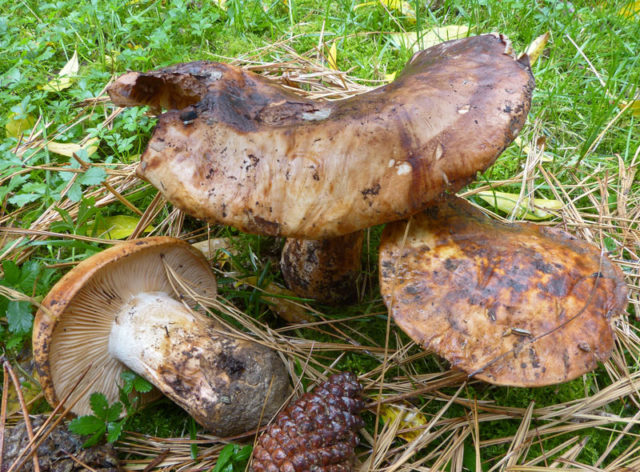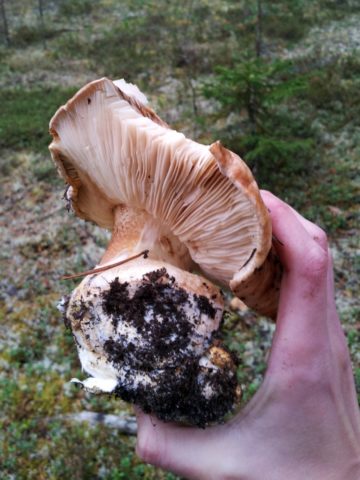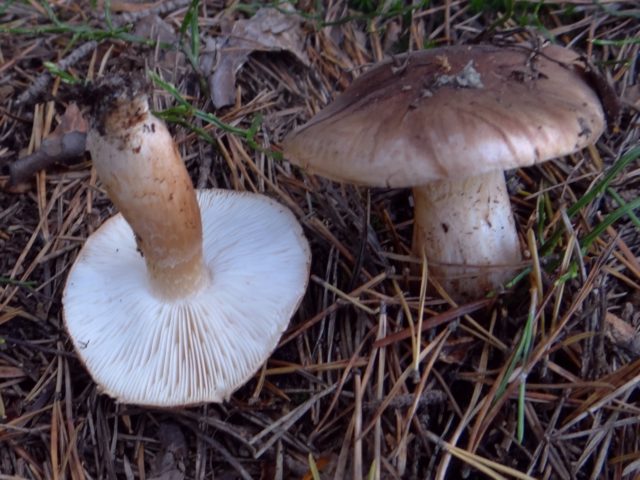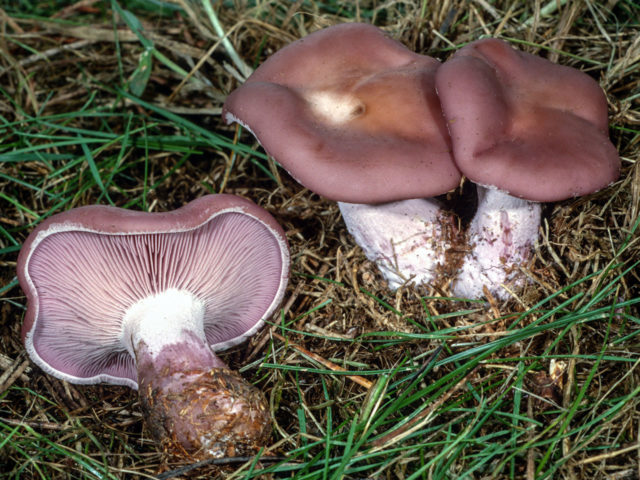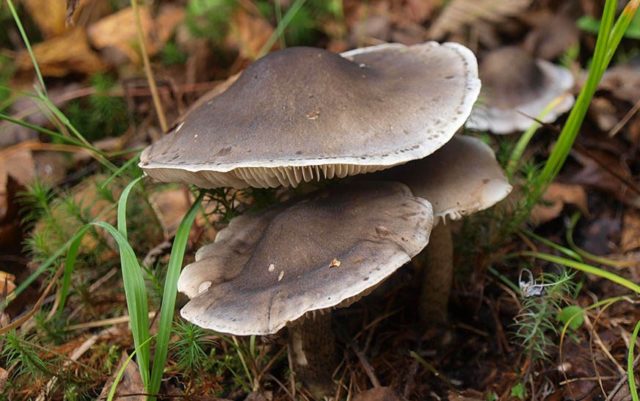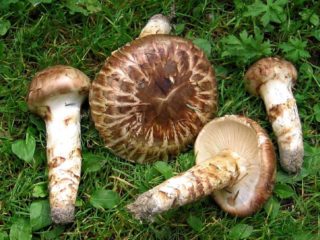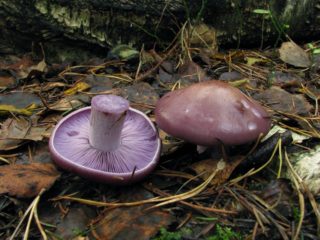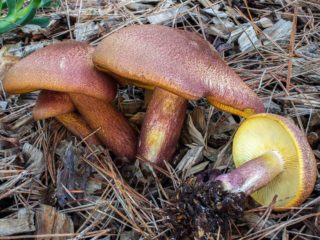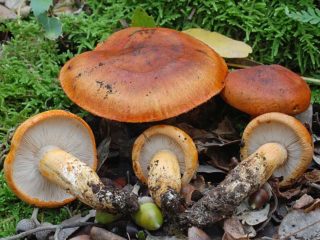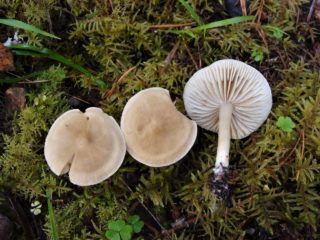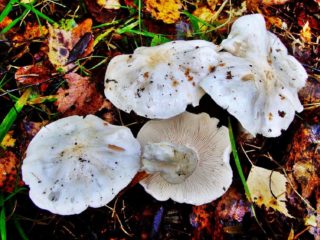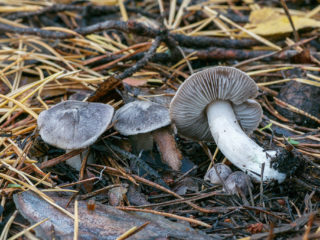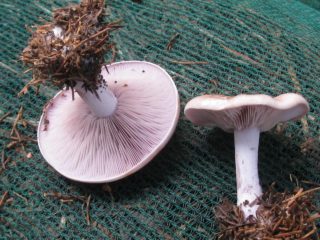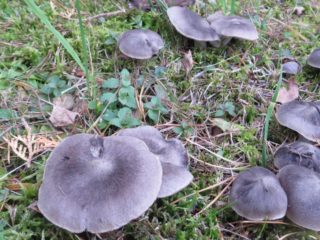Content
The giant row plant belongs to the Lyophyllum family, genus Leucopaxillus. It has another common name - “Ryadovka giant”, which means “earth” in Latin.
Where does the giant row grow?
Mushrooms live in coniferous or mixed forests. They form mycorrhiza with pine. They are found in the Caucasus, European Russia, Crimea, Japan, and North America. The fruiting period lasts from August to September.
What does a giant row look like?
This is a large mushroom in size. The hat is semi-circular with the edges turned down.After a while it takes on a flat shape. Accordingly, the edges curl upward, forming waviness. The diameter is 10-20 cm, sometimes reaching 30 cm. The skin is thin and smooth. The surface is covered with sparse fibers. The color of the cap is brown, red-brown, less often reddish. In the middle the color is more saturated than at the edge.
The leg is elongated, even, smooth. Inside it is dense and strong. The average height is 7-12 cm, sometimes 15 cm. Thickness is 3-8 cm. The part at the base is slightly larger, white. Starting from the middle, the leg acquires a yellow, red-brown tint.
The flesh of the giant row is white and dense. When cut, it changes color to yellow or red. In young fruiting bodies the plates are beige and cream, in adults they are gray and brown. The smell is mealy.
Is it possible to eat giant row?
The mushroom is conditionally edible, belongs to category 4. In rare cases, it causes diarrhea. In Europe, the giant row is a rare species that is listed in the Red Book.
Taste qualities of mushroom
According to mushroom pickers, the pulp has a slightly tart nutty aroma and does not have a special taste. Use giant row after boiling for 20 minutes or in salted form. It is recommended to use only young fruiting bodies. Old pulp has a bitter taste and can only be used for drying.
Benefits and harm to the body
The benefits of giant row plant in folk and official medicine are known. Valuable properties are manifested due to the content of enzymes, vitamins, minerals, and amino acids in the composition of the plant product.
The obtained extracts from giant rowan help to cope with liver diseases, regeneration of organ cells occurs, and toxins are removed from the body. Dermatological ailments are treated with lotions from fruiting bodies.
The enzymes contained in the plant product have a positive effect on the gastrointestinal tract, saturate the brain with useful elements, and protect the body from fatigue.
Giant rowa can cause harm. It is not recommended for use by children under 12 years of age, people with individual intolerance, and nursing mothers. Fungi can trigger attacks of pain in patients with pancreatitis. Low acidity and gallbladder dysfunction are contraindications for the use of giant row.
False doubles
There are many specimens in the Lyophyllum family that share similar external features. It is important to separate edible species from poisonous ones.
The row is white and brown. The cap size is 3-8 cm. The shape is cone-shaped. As it grows it becomes spread out. There is a characteristic tubercle in the middle of the cap. The color of the upper part is red-brown with a white edge along the body. The skin is slimy. The leg is smooth, thinned towards the bottom, grows up to 10 cm, and the thickness is 3 cm. The plates are frequent, white-pink. The pulp is light. Old specimens develop a bitter taste.
The mushroom belongs to the conditionally edible group. However, some mycologists consider it poisonous. Fruiting occurs in August. The variety is found in coniferous thickets and has mycorrhiza with pine.
The row is purple. Large edible species. The cap size is 10-20 cm. The shape is semicircular. Sometimes a depression forms in the center of the cap. The edges are curved. The surface of young fruiting bodies is lilac, bright purple, gradually lighter, acquiring a light brown color.The leg is high, 5-10 cm. Smooth, smooth, elastic. Covered with white flakes. The flesh is light purple, becoming closer to brown after a few days.
The variety grows on rotting needles and in compost heaps. Found in mixed pine forests. Most common in the temperate zone.
The row is soapy. The species is non-toxic. However, it is rarely used for cooking because it has a fruity and soapy smell. This rich aroma does not disappear even after heat treatment.
The mushroom has a flat, smooth surface. The cap is olive or greenish-brown in color. There is a reddish spot in the center, the edges are light. The shape is conical and has a pronounced tubercle. Diameter 3-10 cm. Yellow-green plates are sparsely located. The leg is smooth, white, up to 15 cm high. In old specimens, red spots can be seen in the lower part.
Collection rules
Experienced mushroom pickers recommend organizing a hike into the forest behind the giant row in the morning. When gathering for a “quiet hunt” you must have with you: a knife, a basket or a bucket. It is better not to take a bag, because during transportation the fruiting bodies may break. Be sure to cut off the stem with a knife so that the mycelium remains in the ground. It is not advisable to collect giant rows along highways, near industrial enterprises, since they can absorb particles of heavy metals. Each specimen should be cleaned of sand and dry debris. When you get home, you should go through and sort the harvest.
Use
Young fruiting bodies will be required to prepare giant row for food. They are salted, pickled or boiled. Some mushroom pickers use a dense stem for frying.
Recipe for pickled giant row
Ingredients for marinade: 2 tbsp.l salt and sugar, 2 heads of garlic, 3 pcs. bay leaf, cloves, 70 ml vinegar, 5 currant leaves.
Preparation.
- Pour 2 liters of cold water into a saucepan and place on high heat.
- Chopped garlic, bay leaf, cloves, salt, and sugar are also placed there.
- After boiling, reduce the heat. Continue cooking for 20 minutes.
- Add vinegar, leaves and after 10 minutes turn off the heat.
- 2 kg of boiled mushrooms are placed in pre-pasteurized jars.
- Pour marinade on top and cover with lids.
- They roll it up and take it to the basement.
Conclusion
Giant row is an edible mushroom. The taste is mediocre. When properly prepared, giant row can be used as a snack or for dietary nutrition. Contains a lot of protein. It is recommended to consume the mushroom in small portions.
